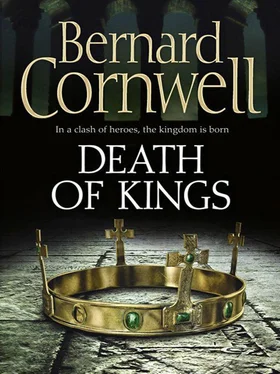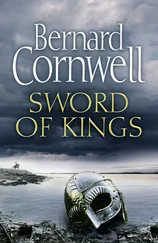Death of Kings
by Bernard Cornwell
Dedication
Death of Kings is for
Anne LeClaire,
Novelist and Friend,
who supplied the first line.

The spelling of place names in Anglo-Saxon England was an uncertain business, with no consistency and no agreement even about the name itself. Thus London was variously rendered as Lundonia, Lundenberg, Lundenne, Lundene, Lundenwic, Lundenceaster and Lundres. Doubtless some readers will prefer other versions of the names listed below, but I have usually employed whichever spelling is cited in either the Oxford or the Cambridge Dictionary of English Place-Names for the years nearest to AD 900, but even that solution is not foolproof. Hayling Island, in 956, was written as both Heilincigae and Hæglingaiggæ. Nor have I been consistent myself; I should spell England as Englaland, and have preferred the modern form Northumbria to N  rhymbralond to avoid the suggestion that the boundaries of the ancient kingdom coincide with those of the modern county. So this list, like the spellings themselves, is capricious.
rhymbralond to avoid the suggestion that the boundaries of the ancient kingdom coincide with those of the modern county. So this list, like the spellings themselves, is capricious.
Baddan Byrig — Badbury Rings, Dorset
Beamfleot — Benfleet, Essex
Bebbanburg — Bamburgh, Northumberland
Bedanford — Bedford, Bedfordshire
Blaneford — Blandford Forum, Dorset
Buccingahamm — Buckingham, Bucks
Buchestanes — Buxton, Derbyshire
Ceaster — Chester, Cheshire
Cent — County of Kent
Cippanhamm — Chippenham, Wiltshire
Cirrenceastre — Cirencester, Gloucestershire
Contwaraburg — Canterbury, Kent
Cracgelad — Cricklade, Wiltshire
Cumbraland — Cumberland
Cyninges Tun — Kingston upon Thames, Greater London
Cytringan — Kettering, Northants
Dumnoc — Dunwich, Suffolk
Dunholm — Durham, County Durham
Eanulfsbirig — St Neot, Cambridgeshire
Eleg — Ely, Cambridgeshire
Eoferwic — York, Yorkshire (called Jorvik by the Danes)
Exanceaster — Exeter, Devon
Fagranforda — Fairford, Gloucestershire
Fearnhamme — Farnham, Surrey
Fifhidan — Fyfield, Wiltshire
Fughelness — Foulness Island, Essex
Gegnesburh — Gainsborough, Lincolnshire
Gleawecestre — Gloucester, Gloucestershire
Grantaceaster — Cambridge, Cambridgeshire
Hothlege, River — Hadleigh Ray, Essex
Hrofeceastre — Rochester, Kent
Humbre, River — River Humber
Huntandon — Huntingdon, Cambridgeshire
Liccelfeld — Lichfield, Staffordshire
Lindisfarena — Lindisfarne (Holy Island), Northumberland
Lundene — London
Medwæg, River — River Medway, Kent
Natangrafum — Notgrove, Gloucestershire
Oxnaforda — Oxford, Oxfordshire
Ratumacos — Rouen, Normandy, France
Rochecestre — Wroxeter, Shropshire
Sæfern — River Severn
Sarisberie — Salisbury, Wiltshire
Sceaftesburi — Shaftesbury, Dorset
Sceobyrig — Shoebury, Essex
Scrobbesburh — Shrewsbury, Shropshire
Snotengaham — Nottingham, Nottinghamshire
Sumorsæte — Somerset
Temes, River — River Thames
Thornsæta — Dorset
Tofeceaster — Towcester, Northamptonshire
Trente, River — River Trent
Turcandene — Turkdean, Gloucestershire
Tweoxnam — Christchurch, Dorset
Westune — Whitchurch, Shropshire
Wiltunscir — Wiltshire
Wimburnan — Wimborne, Dorset
Wintanceaster — Winchester, Hampshire
Wygraceaster — Worcester, Worcestershire

The Royal Family of Wessex


‘Every day is ordinary,’ Father Willibald said, ‘until it isn’t.’ He smiled happily, as though he had just said something he thought I would find significant, then looked disappointed when I said nothing. ‘Every day,’ he started again.
‘I heard your drivelling,’ I snarled.
‘Until it isn’t,’ he finished weakly. I liked Willibald, even if he was a priest. He had been one of my childhood tutors and now I counted him as a friend. He was gentle, earnest, and if the meek ever do inherit the earth then Willibald will be rich beyond measure.
And every day is ordinary until something changes, and that cold Sunday morning had seemed as ordinary as any until the fools tried to kill me. It was so cold. There had been rain during the week, but on that morning the puddles froze and a hard frost whitened the grass. Father Willibald had arrived soon after sunrise and discovered me in the meadow. ‘We couldn’t find your estate last night,’ he explained his early appearance, shivering, ‘so we stayed at Saint Rumwold’s monastery,’ he gestured vaguely southwards. ‘It was cold there,’ he added.
‘They’re mean bastards, those monks,’ I said. I was supposed to deliver a weekly cartload of firewood to Saint Rumwold’s, but that was a duty I ignored. The monks could cut their own timber. ‘Who was Rumwold?’ I asked Willibald. I knew the answer, but wanted to drag Willibald through the thorns.
‘He was a very pious child, lord,’ he said.
‘A child?’
‘A baby,’ he said, sighing as he saw where the conversation was leading, ‘a mere three days old when he died.’
‘A three-day-old baby is a saint?’
Willibald flapped his hands. ‘Miracles happen, lord,’ he said, ‘they really do. They say little Rumwold sang God’s praises whenever he suckled.’
‘I feel much the same when I get hold of a tit,’ I said, ‘so does that make me a saint?’
Willibald shuddered, then sensibly changed the subject. ‘I’ve brought you a message from the ætheling,’ he said, meaning King Alfred’s eldest son, Edward.
‘So tell me.’
‘He’s the King of Cent now,’ Willibald said happily.
‘He sent you all this way to tell me that?’
‘No, no. I thought perhaps you hadn’t heard.’
‘Of course I heard,’ I said. Alfred, King of Wessex, had made his eldest son King of Cent, which meant Edward could practise being a king without doing too much damage because Cent, after all, was a part of Wessex. ‘Has he ruined Cent yet?’
‘Of course not,’ Willibald said, ‘though…’ he stopped abruptly.
‘Though what?’
‘Oh it’s nothing,’ he said airily and pretended to take an interest in the sheep. ‘How many black sheep do you have?’ he asked.
‘I could hold you by the ankles and shake you till the news drops out,’ I suggested.
‘It’s just that Edward, well,’ he hesitated, then decided he had better tell me in case I did shake him by the ankles, ‘it’s just that he wanted to marry a girl in Cent and his father wouldn’t agree. But really that isn’t important!’
I laughed. So young Edward was not quite the perfect heir after all. ‘Edward’s on the rampage, is he?’
‘No, no! Merely a youthful fancy and it’s all history now. His father’s forgiven him.’
Читать дальше
Конец ознакомительного отрывка
Купить книгу


 rhymbralond to avoid the suggestion that the boundaries of the ancient kingdom coincide with those of the modern county. So this list, like the spellings themselves, is capricious.
rhymbralond to avoid the suggestion that the boundaries of the ancient kingdom coincide with those of the modern county. So this list, like the spellings themselves, is capricious.













